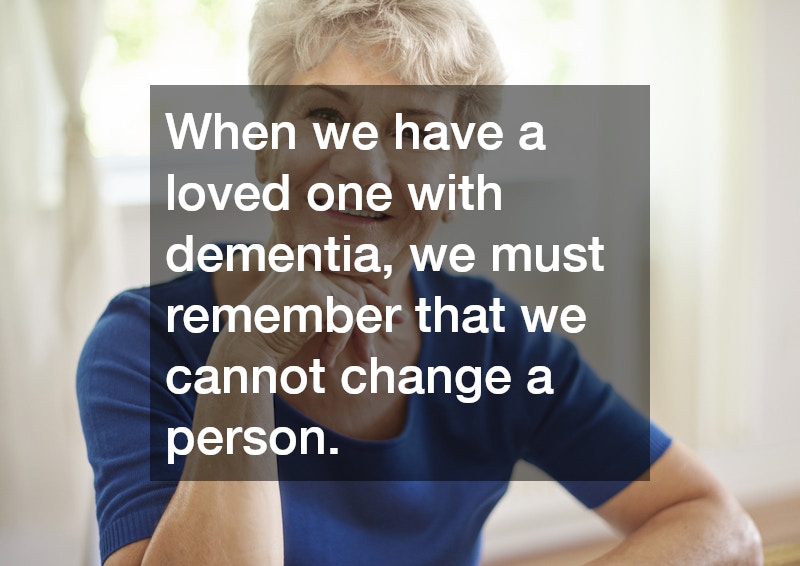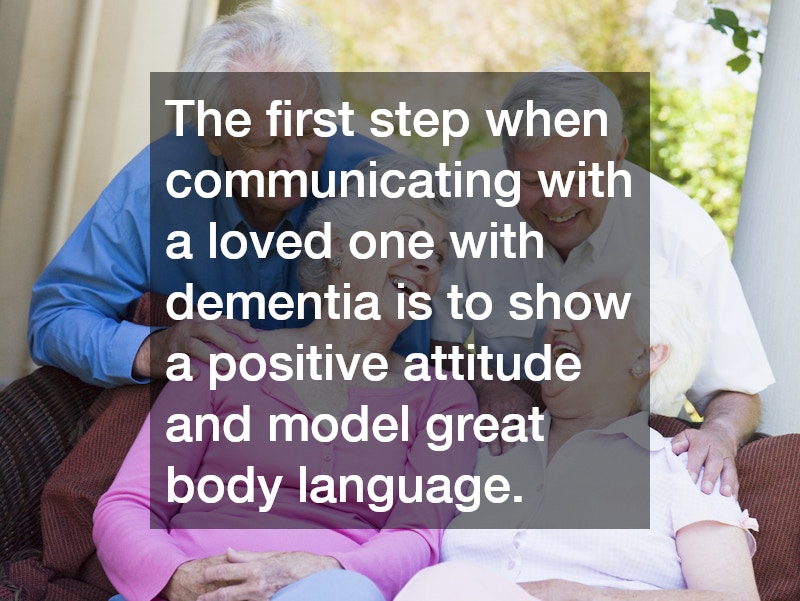
When we have a loved one with dementia, we must remember that we cannot change a person. We can not make them the old person they were or make them remember special moments or significant events of the past. The skill that comes with effective communication with a loved one who has dementia is not something we are naturally trained for. However, the ability to effectively communicate and care for someone with this illness is an ability that can be learned.

The first step when communicating with a loved one with dementia is to show a positive attitude and model great body language. This sets the tone for effective communication.
We can also:
• Limit distracting noises by turning, shutting doors, closing curtains, or turning off the television.
• Speak, slowly, and in an even tone without raising your voice or getting upset when they don’t understand what you are trying to communicate.
• When dealing with parents with dementia, ask one question at a time that requires simple answers such as yes or no.
• Be a listener and watch their body language.
• reassure them, especially when stay-in-home care services are needed for everyday care.
• When finding homecare services, look for caring workers who respond with affection, humor, and confidence rather than frustration and impatience.
• Remember the old days and remind them often. Reliving the good from the past is not only good for you but also reassuring for them.

If you have a loved one who is suffering from dementia, it’s important to learn about the details of this condition. With some basic knowledge, you can find out how to take proper care of them, from which point you could either hire a caretaker or look for good dementia care facilities to which you can take them. In this case, you’ll be aware of what to expect in terms of good days and bad days with dementia so that you can prepare yourself mentally. With the knowledge that you get while doing research, you can tell what you need to look for in terms of quality dementia care.

If you can’t set aside the time to take care of the person in your life who is suffering from dementia, get started looking for a professional dementia care center. In this case, you could search for emergency placement for dementia patients in an area that’s safe and easily accessible for you. If there aren’t any good dementia-specific aged care facilities in your area, you should be flexible enough to search within a wider radius. That’s because when you know that your loved one is getting the best care, you won’t have trouble keeping up with the rest of your life’s demands.

If one of your loved ones displays the loss of ability to think logically and clearly, they may be exhibiting the symptoms of dementia. If you see those symptoms, it can be wise to bring your loved one to your family doctor to rule out alternative medical conditions. Some conditions have similar symptoms to dementia, so a doctor’s visit is wise.
You may wonder, “What is it like having dementia?” Dementia is a progressive condition, and it often begins with signs of confusion and personality changes. Red flag signs of dementia include inability to recognize family members, neglect of health necessities like eating or bathing, and gradual loss of the ability to speak.
Alzheimer’s Disease is one of the most common conditions that includes symptoms of dementia. Alzheimer’s Disease is diagnosed by its stages, with Alzheimer type II showing a worsening of the confusion and personality changes of Alzheimer’s type I. While many families try to care for loved ones with dementia, there often comes a time when the victim needs more medical assistance than the family can give. At this stage, most people turn to a senior placement agency to find the right place for their loved ones.

Life can be best described as a sequence of moments linked together by a sense of continuity, but what about those with trouble recalling past events or for those with memories that may not have happened? Mental health disorders such as Alzheimers and dementia are difficult to understand and treat, especially so for families trying to care for the afflicted. If you believe that a loved one is exhibiting the symptoms of Alzheimers, it may be best to seek out professional senior care options to help improve their quality of life.
The Reality of Alzheimers
Alzheimers is the sixth leading cause of death in the United States and the only top 10 cause of death in the United States that cannot be prevented, slowed, or cured — there are treatments that may help to temporarily improve one’s cognitive skills, but this too only delays the disease. Overall, it is estimated that one out of every three seniors pass away with Alzheimers or some form of dementia. Most people who are diagnosed with Alzheimers have “late-onset” Alzheimers that takes place after the age of 60, a small percentage of those who are diagnosed with the disease develop it before this age and as early as 30 or 40 years. While experts are still trying to understand Alzheimers, it is known that around two-thirds of Alzheimers patients in the United States are women.
Recognizing the Symptoms of Alzheimers
Alzheimers is a progressive disease that often only becomes immediately recognizable once the condition has significantly impacted one’s routine. The symptoms of Alzheimers are linked to decreases in cognitive function, memory loss, confusion, and changes of mood and personality. Often, those who suffer from Alzheimers will be unaware of the passage of time and may find themselves forgetting where they are or how they got there. The confusion can quickly cause irritability, depression, and even paranoia for many patients. While some families try to help their loved one as best as they can, the task may quickly prove to be too emotionally demanding — this is where professional senior care services come in handy.
Finding Senior Care Services

Of assisted living residents, over three-quarters have ad at least two of the 10 most common chronic conditions: high blood pressure and Alzheimers are the most prevalent. While these professional caregivers are experienced when it comes to identifying and assisting with the symptoms of Alzheimers, new studies show that many of today’s Americans over the age of 65 have not talked about critical long-term care issues with their spouses, aging parents, or adult children. On the contrary, many Americans are rejecting the idea of retirement all together and continuing to work well into their 90s — the U.S. Department of Labor statistics show that there are presently 1.2 million people above the age of 75 who work either full or part time. If these individuals were to develop Alzheimers, the question of senior care and retirement need no longer be a question but a definitive. If a loved one is exhibiting the symptoms of Alzheimers, don’t wait: schedule a consultation with your doctor and determine together what the best direction ought to be.
